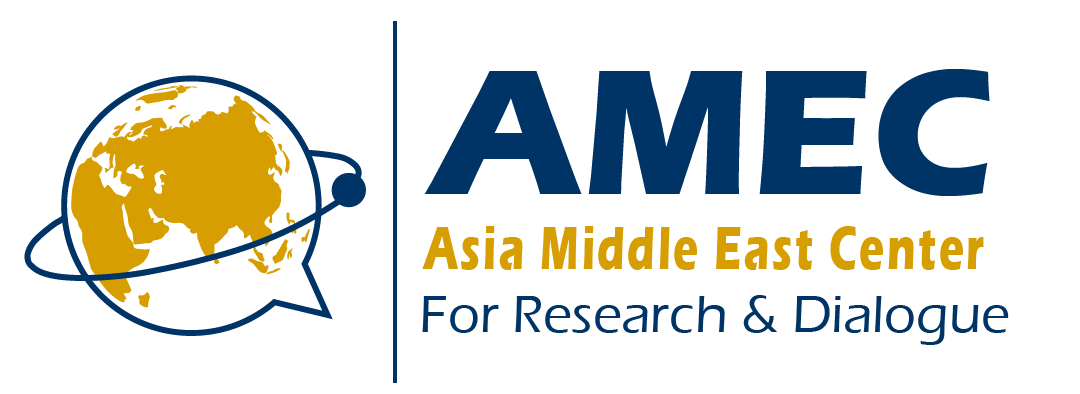ASEAN-GCC Interactions in a Changing Global Order: Bridging Regions – Opportunities and Challenges

Date: 8 July 2025 (Tuesday)
Venue: IAIS Hall, Kuala Lumpur
Organizers: Asia Middle East Center for Research and Dialogue (AMEC) & International Institute of Advanced Islamic Studies (IAIS) Malaysia
Format: Round Table Discussion (RTD)
Language: English
Introduction
In an era of accelerating geopolitical and economic transformation, ASEAN and the Gulf Cooperation Council (GCC) stand as critical regional blocs with rising global influence. To address shared challenges and explore new synergies, the Asia Middle East Center for Research and Dialogue (AMEC) and the International Institute of Advanced Islamic Studies (IAIS) Malaysia jointly hosted a Round Table Discussion (RTD) on “ASEAN-GCC Interactions in a Changing Global Order: Bridging Regions – Opportunities and Challenges” on 8 July 2025.
Timed with Malaysia’s 2025 ASEAN Chairmanship, the event brought together diplomats, thought leaders, and policy practitioners to explore avenues for economic integration, cultural connectivity, and strategic cooperation.
Opening and Keynote Remarks
Dr. Muslim Imran (Director, AMEC)
Dr. Muslim Imran opened the round table by reaffirming AMEC’s commitment to deepening ASEAN-GCC engagement. Building upon the momentum of AMEC’s 2024 international conference in Jakarta, he positioned the event within a broader trajectory of sustained dialogue.
He emphasized that in today’s multipolar and uncertain global context, ASEAN and the GCC must chart a collaborative course grounded in mutual respect, strategic neutrality, and shared values.
Key themes included:
- Economic Synergies: Trade is projected to grow from US$130B (2023) to US$180B by 2032, especially in digital infrastructure, halal industries, and climate finance.
- Security Collaboration: Advocated for maritime and cyber cooperation, as well as shared frameworks to address extremism and climate-related crises.
- Cultural Trust: Called for deeper people-to-people diplomacy through education, youth programs, and academic cooperation—supported by recent AMEC university MoUs.
- Malaysia’s Leadership: As ASEAN Chair, Malaysia has the opportunity to bridge regions intellectually, diplomatically, and economically.
“Let us continue this journey together—with sincerity, clarity, and purpose.”
Prof. Dr. Maszlee Malik (Chairman, IAIS Malaysia)
In his welcoming remarks, Dr. Maszlee emphasized that ASEAN-GCC ties must evolve beyond symbolism into functional, inclusive, and adaptive partnerships. He proposed building “intellectual infrastructure”—trust networks and shared policy narratives—as the foundation for durable cooperation.
Tan Sri Syed Hamid Albar (Honorary Advisor, AMEC)
Tan Sri Syed Hamid’s keynote highlighted the historical convergence between ASEAN and GCC through trade and shared values. He urged the development of institutional mechanisms (e.g., summits, working groups, civil society exchanges) and identified key areas for cooperation such as Islamic finance, renewable energy, and digital sovereignty.
YB Tuan Liew Chin Tong (Deputy Minister, MITI)
YB Liew Chin Tong reinforced the need for practical, region-to-region cooperation. He cited ASEAN-GCC trade volumes and prioritized sectors like supply chains, energy transition, and digital governance, affirming that Malaysia’s ASEAN Chairmanship presents a timely opportunity to push toward a formal FTA framework.
Expert Presentations
- Ms. Maryam Ismail (ISIS Malaysia)
On cross-cultural connectivity, she spotlighted social media, education, and media as critical avenues for diplomacy and mutual trust. - Ms. Nabila Natasha Osman (AMEC)
Presented Qatar-Singapore relations as a replicable model for ASEAN-GCC economic, innovation, and diplomatic integration. - Ms. Masni Muhammad (MIDA)
Highlighted Malaysia’s RM378.5B investment record, and GCC interest in green energy, digital infrastructure, and halal industries—urging groundwork for an ASEAN-GCC FTA.
Reflections and Closing Remarks
Dr. Ahmad Badri Abdullah (Deputy CEO, IAIS)
Dr. Badri positioned ASEAN-GCC cooperation within a larger “Asian order”, calling for multilateral policy frameworks, clean energy consortiums, and shared digital platforms. He proposed:
- ASEAN-GCC Economic Corridor
- Think tank and civil society networks
- Joint innovation and trade facilitation platforms
Mr. Muath Seyam (Director, RTD – AMEC)
Mr. Muath Seyam closed the session by summarizing the core pillars that emerged:
- Sectoral Synergy (green finance, digital, halal trade)
- Cultural & Educational Diplomacy (youth, media, academia)
- Strategic Coordination (crisis response, governance, supply chains)
He praised the event as a launchpad for structured, enduring engagement, aligning with Malaysia’s diplomatic leadership in 2025.
“Let this be the beginning of deeper and more structured engagements between our regions.”
Key Takeaways
- ASEAN-GCC relations are strategic, not symbolic, built on shared history and aligned global visions.
Economic potential is vast—trade, halal markets, fintech, and digital economies are growth sectors. - Deep people-to-people trust is essential for resilient cooperation.
- Malaysia, as ASEAN Chair, is well positioned to lead efforts in rule-based, inclusive frameworks.
AMEC’s Commitment
AMEC remains dedicated to building bridges between Asia and the Middle East. Through research, dialogue, and partnership facilitation, it will continue to promote inclusive and strategic ASEAN-GCC engagement.







